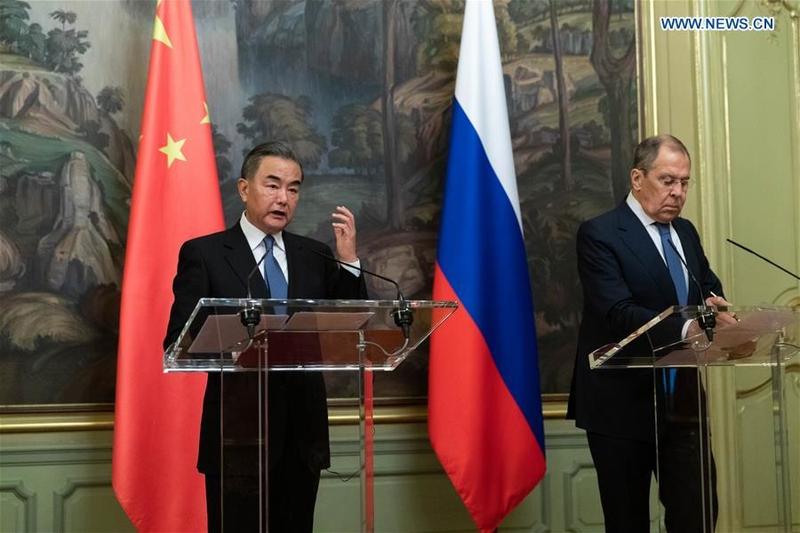 Chinese State Councilor and Foreign Minister Wang Yi (left) and Russian Foreign Minister Sergei Lavrov meet the press after their talks in Moscow, Russia, on Sept 11, 2020. (BAI XUEQI/XINHUA)
Chinese State Councilor and Foreign Minister Wang Yi (left) and Russian Foreign Minister Sergei Lavrov meet the press after their talks in Moscow, Russia, on Sept 11, 2020. (BAI XUEQI/XINHUA)
MOSCOW - China has never interfered in the internal affairs of the United States, Chinese State Councilor and Foreign Minister Wang Yi said Friday at a press conference after talks with Russian Foreign Minister Sergei Lavrov.
Now is the time that China asks the United States not to interfere in China's internal affairs, Wang Yi said
China has never interfered in the internal affairs of other countries, and, of course, it has never interfered in the internal affairs of the United States, Wang said, adding that it is China's diplomatic tradition and the Chinese way to handle affairs, as well as a basic principle of international relations.
Now is the time that China asks the United States not to interfere in China's internal affairs, he said.
ALSO READ: Get China-US ties back on track
The National People's Congress, China's top legislature, has never discussed or introduced bills on internal affairs of the United States, but the US Congress has been constantly rolling out bills on China's internal affairs, he added.
The United States has gone too far, Wang said, adding that some people in the United States should manage their own affairs first, abide by the norms of international relations, and stop interfering in the internal affairs of other countries.
On bilateral ties, Wang said that China is ready to work with Russia to make comprehensive preparations for future high-level interactions and make plans for further cooperation in various areas.
On bilateral ties, Wang said that China is ready to work with Russia to make comprehensive preparations for future high-level interactions and make plans for further cooperation in various areas
Both countries should continue their close coordination, better cooperate in epidemic prevention and control, explore new ways of cooperation amid the pandemic, and facilitate cross-border movement of people and freight, he said.
Russia stands ready to strengthen strategic coordination with the Chinese side, attach importance to the central role of the Association of Southeast Asian Nations in regional cooperation, and jointly maintain regional peace and stability, Lavrov said.
Uunilateralism, protectionism opposed
In a joint statement, China and Russia said they firmly oppose unilateralism and protectionism, oppose power politics and bullying, and oppose unilateral sanctions that have no basis in international law, as well as "long-arm jurisdiction."
READ MORE: China refutes US allegations, stresses non-interference
As this year marks the 75th anniversary of the end of World War II and the founding of the United Nations (UN), China and Russia as the permanent members of the UN Security Council reiterate their unwavering commitment to multilateralism, according to the statement.
The two countries call on the international community to jointly preserve the international system with the UN at its core and the international order underpinned by international law.
China and Russia are deeply concerned about the fact that amid the COVID-19 pandemic, some countries spread fake information, which endangers people's health, undermines social order, and obstructs the mutual understanding of peoples around the world
The two countries will work to maintain world peace and stability, uphold international fairness and justice, and advocate reforming and improving the global governance, the statement added.
China and Russia are deeply concerned about the fact that amid the COVID-19 pandemic, some countries spread fake information, which endangers people's health, undermines social order, and obstructs the mutual understanding of peoples around the world, according to the statement.
The two countries reaffirm their support for the World Health Organization in coordinating global cooperation against the pandemic, and called for stopping politicizing the pandemic.
On global security, the two sides call on the international community to jointly combat terrorism and extremism in all forms, and oppose "double standards" on counter-terrorism.
They also call for preventing any conflicts between countries caused by illegal use of information and communication technologies.
Both sides recognize the digital economy's overall impact on the economic and social development of all countries as well as on the global governance system.
They call on all countries to reach global data security rules that reflect the wishes of all countries and respect the interests of all parties on the basis of universal participation.


